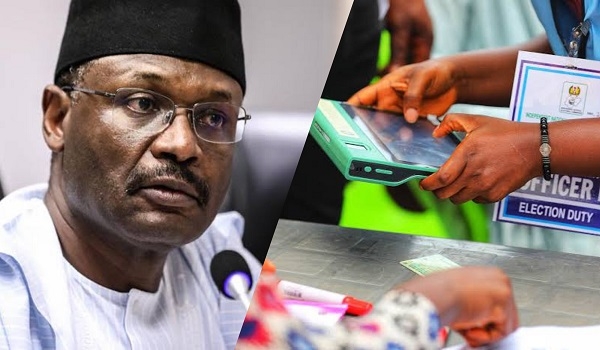The reasons why the Independent National Electoral Commission (INEC) did not suspend the collation of results during the conduct of the February 25 presidential election have emerged.
According to The Nation, INEC did not suspend the collation of results because the glitches experienced did not affect all the results already transmitted through the Bimodal Voter Accreditation System (BVAS).
It was also gathered BVAS can store information offline for upload later into INEC Result Viewing Portal (IReV).
None of the collated results was lost or tampered with because of Plan B was activated when the glitches occurred.
The Nation reported that sources also said INEC may report some Resident Electoral Commissioners (RECs) to President Muhammadu Buhari for sanctions over alleged dereliction of duty and insubordination.
A fact-sheet sighted revealed that “the glitches had no effect on the collation process or the results.”
It added: ”BVAS can store information offline. The working of BVAS was the reason why you have the competitive results by the presidential candidates.
“INEC results substantially tallied with the figures arrived at by some international non-governmental organisations.”
Findings confirmed that INEC was “ready to show all the proofs before the Presidential Election Tribunal.
Corroborating the fact sheet a reliable source told select editors in Abuja that “the glitches didn’t affect either the results or the integrity of the process including the transmission of results.
“The glitches occurred because INEC didn’t test run the technology in the field to avoid being misunderstood.
“When INEC started uploading, the first glitch occurred in the infrastructure of IReV.
“As soon as the glitch happened, there was panic that the system was being hacked. To save the system, the plug was pulled off for both the Presidential and National Assembly Elections.
“The Chairman of INEC, a national commissioner and two patriotic staff quickly activated Plan B.
“By the time the glitches were resolved, IReV fully came on stream.
“As at 8pm, the Presidential Election results had higher upload than the National Assembly Elections.
“INEC’s confidence was based on its belief that technology would save the day. It is to the glory of the organisation that the technology was able to stand.”
Responding to a question, the source said: “BVAS was the reason Alex Otti won in Abia State while Tinubu and Ganduje lost in their political domains. BVAS has shown the real people that voted and the true results.
“IReV is the reason why candidates can go to tribunals to contest the results of any strand of elections.”
It was learnt that the INEC management may report at least two Resident Electoral Commissioners (RECs) to President Muhammadu Buhari for sanctions for alleged sabotage, partisanship, insubordination and nonchalant attitude to duties.
By Section 157 (1) of the 1999 Constitution, the Chairman of INEC, Mahmood Yakubu, cannot remove a Resident Electoral Commissioner.
The RECs have been asked to stay away from duties pending the final decision of INEC management.
They are the RECs in Sokoto and Abia states.
The source said: “The INEC chairman, Prof. Mahmood Yakubu, does not condone indiscipline. He and his team have decided to wield the big stick to serve as deterrent to others.
“So far, INEC management may report the RECs to President Muhammadu Buhari for sanctions. It has never happened, but the management is going the whole hog to show its readiness to enforce discipline.
“I can give the details of what they did. A REC refused to deploy staff and materials on election day until 2pm. He switched off his phones for no justifiable reasons.
“When he became incommunicado, the commission directed the Administrative Secretary in the state to take charge.
“For Sokoto State, INEC withdrew the REC because the conduct of elections under him collapsed. He was helpless and was allegedly taking orders from elsewhere.
“From findings, he had no experience at all. He was managing a hotel in Kano before he got the appointment.”
The source explained how some weak RECs were handpicked and imposed on INEC about three months to the just-concluded elections.
The source added: “Most of the 19 RECs, who came on board three months to the elections, were obviously partisan.
“All the nominees recommended by INEC were rejected.
“In fact, one of the RECs was a suspended staff of INEC who was later appointed the chairman of a State Independent Electoral Commission.
“Another was a governorship aspirant in 2015.”
Responding to a question, the source said only the President can remove a REC by virtue of Section 157(1) of the 1999 Constitution.
The section says in part: “… a person holding any office to which this section applies may be removed from that office by the president acting on an address supported by two-thirds majority of the Senate praying that he be so removed for inability to discharge the functions of the office (whether arising from infirmity of mind or body or any other cause) or for misconduct.”










Discussion about this post